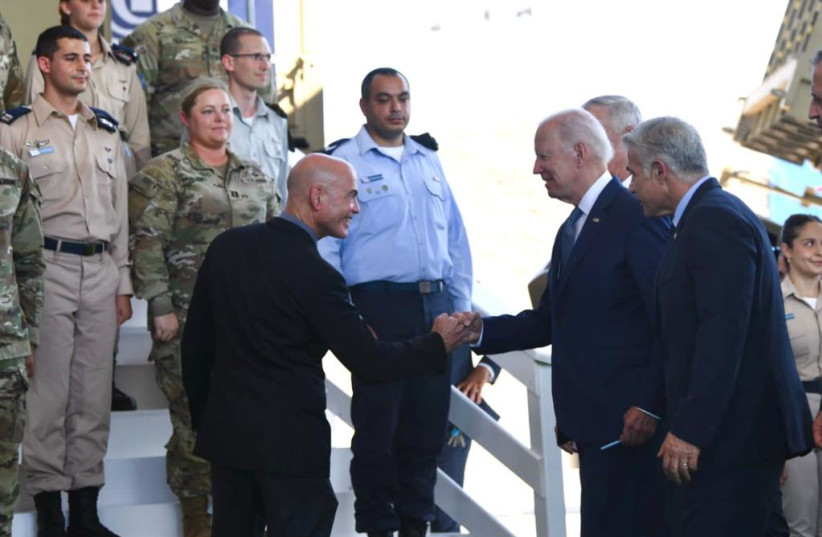US President Joe Biden was presented with Israel’s latest missile defense system, the “Iron Beam” laser system during the start of his visit in Israel and Saudi Arabia this week.
Biden landed at Ben Gurion International Airport on Wednesday afternoon and was received by an honor guard and in the presence of President Isaac Herzog, Prime Minister Yair Lapid and Alternate Prime Minister Naftali Bennett.
Shortly after landing, Biden met with Defense Minister Benny Gantz, IDF Chief of Staff Lt.-Gen. Aviv Kohavi and other senior security officials. During the briefing, Biden was shown a video of the capabilities of Israel's air defense systems.
Following the meeting, the President toured a display of the air missile defense systems including the long-range Arrow, medium-range David’s Sling, short-range Iron Dome, and the high-powered laser Iron Beam interception system.
Together the systems provide Israel with a protective umbrella able to counter threats posed by both short, mid and long-range missiles used by terror groups in Gaza and Hezbollah as well as the threat posed by more sophisticated long-range Iranian ballistic missiles.

Israel continuously improves the technology behind the country’s anti-missile systems, and the Iron Dome along with the Iron Beam and naval Barak can also intercept drones and other aerial platforms. The Iron Beam is expected to work in tandem with the Iron Dome once it becomes operational in the next few years.
While at the display, Director-General of the Defense Ministry, Maj. Gen. (res.) Amir Eshel, presented the Iron Beam system to the United States Secretary of State, Mr. Antony Blinken, and National Security Advisor to the President of the US, Jack Sullivan.
Eshel also showed them the remains of an unmanned aerial vehicle and a mortar that had been intercepted by the system during a series of tests conducted this past April.
Thanking him for the funding for additional Tamir Iron Dome interceptor missiles, Gantz told the president that the alliance between the two countries “is stronger than ever” and that Jerusalem is “confident” that Washington “will continue to take the necessary steps to prevent Iran from acquiring nuclear weapons.”
The defense minister also noted that security cooperation in the region has intensified and expanded “in an unprecedented manner,” hinting to a regional air defense alliance that would see Israel work alongside Gulf countries to counter threats posed by Iran and its proxies.
The military cooperation in the region includes “many countries that see a need for stability and the development of sustainable peace,” he said. “Strengthening the security stability the United States is leading in the region, is a condition for both economic development and preserving human rights, and I am sure that under your leadership and together with all US security bodies, we will continue to develop it in all areas — air, sea, land and cyber.”
Kohavi, who also toured the systems with Biden said that "the operational cooperation and close coordination between the United States and Israel constitute further proof of the important strategic alliance between the two countries."
"Our relationship with the United States is a significant step in preserving regional stability."
IDF Chief of Staff Aviv Kohavi
"The strategic relations between the armies are a key pillar in maintaining security stability and in dealing with the common challenges in the Middle East and we strive to create a variety of new opportunities for air, sea and land cooperation,” the chief of staff continued, adding that “our relationship with the United States is a significant step in preserving regional stability, and in the face of the ongoing strategic race with Iran that not only endangers Israel but poses a regional and global danger, the countries of the region are required to act together.”
Tzvi Joffre contributed to this report.
